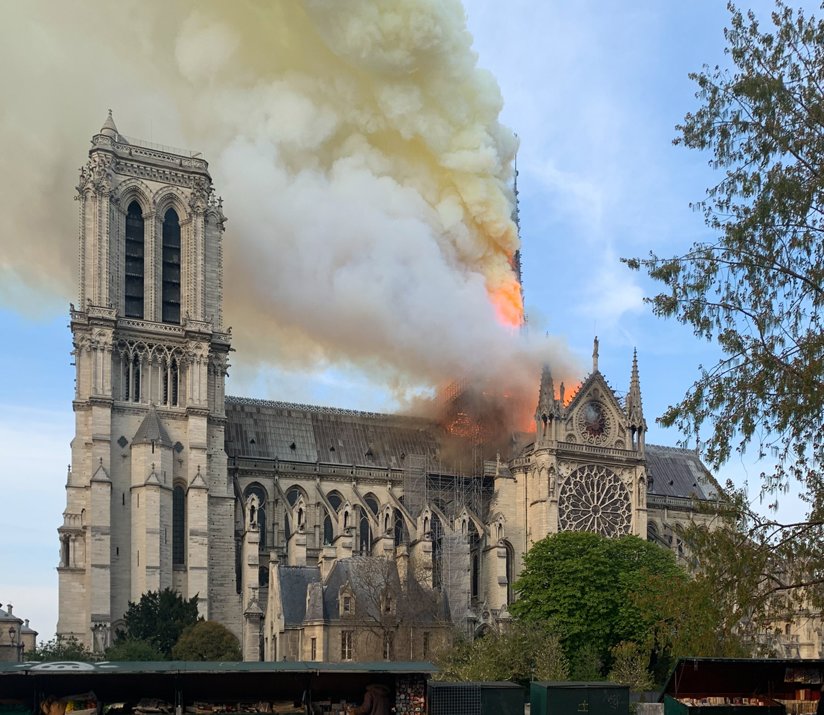
-
HOME
-
WHAT IS STANDOur Mission Our Values Our Help Contact
-
WHAT WE FIGHT FORReligious Freedom Religious Literacy Equality & Human Rights Inclusion & Respect Free Speech Responsible Journalism Corporate Accountability
-
RESOURCESExpert Studies Landmark Decisions White Papers FAQs David Miscavige Religious Freedom Resource Center Freedom of Religion & Human Rights Topic Index Priest-Penitent Privilege Islamophobia
-
HATE MONITORBiased Media Propagandists Hatemongers False Experts Hate Monitor Blog
-
NEWSROOMNews Media Watch Videos Blog
-
TAKE ACTIONCombat Hate & Discrimination Champion Freedom of Religion Demand Accountability
What Does a Cathedral on Fire Have To Do With You?
It was April 2019, the beginning of Easter celebrations in France. That’s when, to the world’s horror, the 850-year-old Notre-Dame de Paris Cathedral erupted in flames.
Was it just an accident, terrible timing, or did someone intend to set this fire?
The truth is, no one knows. But arson is very likely, because Notre-Dame de Paris was only the most attention-grabbing of the hundreds of church burnings France has seen in the past decade.

And it goes on—just this July, a fire in the 15th-century Nantes Cathedral destroyed stained-glass windows and the world-renowned grand organ inside. Restoration could take three years.
An arsonist has confessed to the crime. As usual, there is little pattern in these firebugs: a report by the National Catholic Register suggests they are everything from anarchists to Satanists.
But what do these incidents have in common? Simple: “This destruction, at the hands of a variety of actors, barely receives a glance from the French state, prosecutors, media or public. Rarely are the attackers identified or apprehended.”
In light of that dark passage of its history, official France must wake up from its indifference.
“We also see this happening to churches in Northern Cyprus, Egypt, northern Nigeria and other places where certain members of society are hostile to a small and weak Christian community and the government itself is indifferent.”
But France is an “enlightened” country!
Yes, but it is also less and less concerned about faith. WorldAtlas tells us “…with the high number of Catholics and Protestants in France, only 5% of them either go to church or attend mass thus many consider France a secular nation.”
No one is claiming that things are as bad as, say, Pakistan, where Buddhist artifacts are being dynamited.
But let’s not forget the violence with which France broke the power of the Church in its own revolution:
“In October 1793, public worship was forbidden and over the next few months all visible signs of Christianity were removed… crosses were taken from churches and cemeteries, and statues, relics and works of art were seized and sometimes destroyed… churches were closed, to be converted into warehouses, manufacturing works or even stables… Christianity had no place in the Republic.” (History Today)
I’ve seen this for myself. A few years ago, I visited an abbey in southwestern France. During the French Revolution, it was converted into a stable and a barracks. Restored, it is now the pride of its region. But statues of saints are still defaced from that day, long ago, when destruction was permitted, even encouraged.
It’s that way, too, with bigotry. Tolerate it and you will soon have a great deal more injustice in other parts of your society.
In light of that dark passage of its history, official France must wake up from its indifference, its lack of interest in what it must see as nothing more than cultural curiosities, when they have so many other problems.
Because it’s bigotry. Because bigotry doesn’t have to be angry. It can be apathetic, as indifference to the burning cathedrals of France reveals.
You see, only a tiny percentage of your people may care about what happens to religious structures. And eventually, violence spreads with little restraint.
It’s that way, too, with bigotry. Tolerate it and you will soon have a great deal more injustice in other parts of your society.
Today, governments must watch over freedom of religion, including the freedom to have a place to pray. It’s actually in the interests of their own survival.
And we, as a people, must, must oppose all hatred wherever it occurs, even if we don’t share the beliefs or profiles of those being attacked.
Because one day, if we don’t, that violence will visit us.









